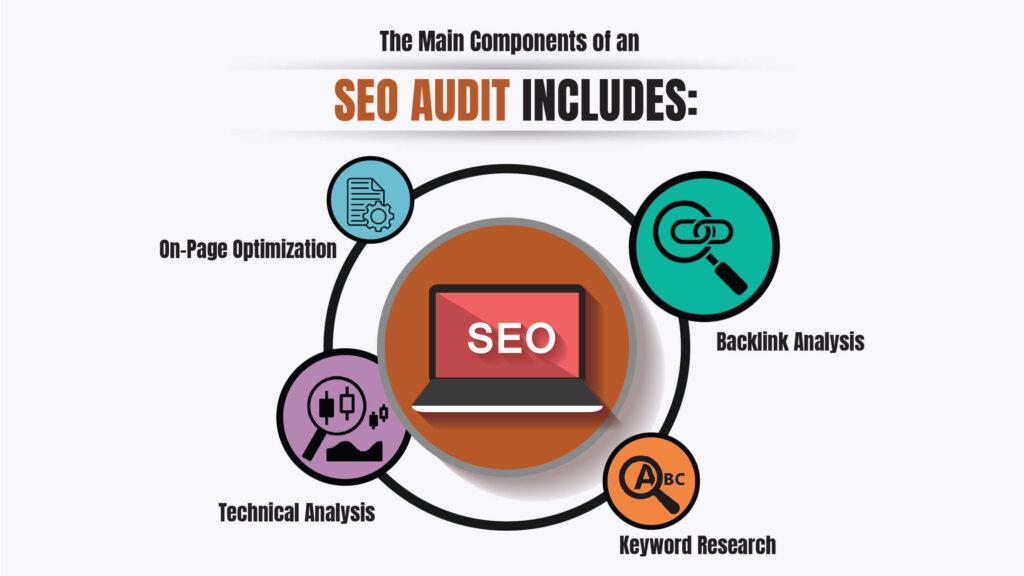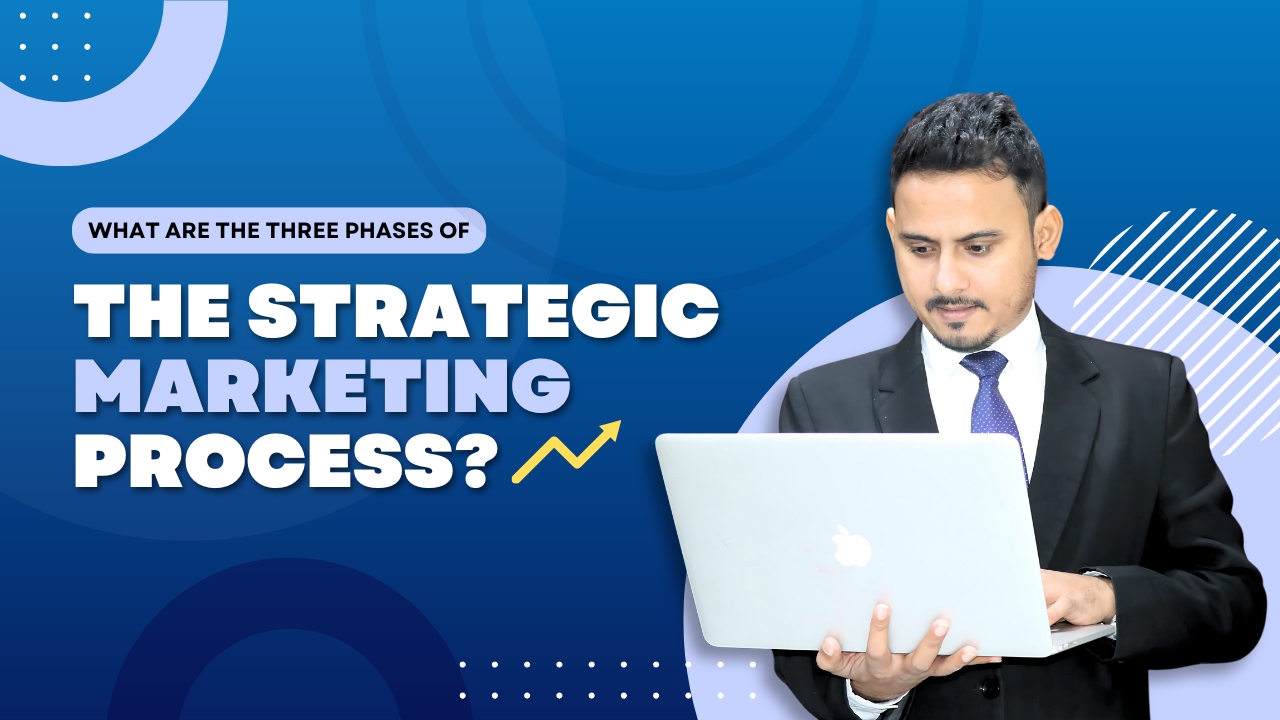Introduction
Nowadays, where search engines have become a source in connecting businesses with their target audience, search engine optimization (SEO) has become an important factor for an online business.
As many of you think, by implementing effective SEO strategies, businesses can improve their website’s visibility, attract organic traffic, and ultimately increase conversions. However, simply implementing the SEO strategy is not enough. You should regularly conduct an effective SEO audit. Which is crucial for optimizing your website’s performance and staying ahead among your competitors.
An SEO audit helps you to evaluate your website’s SEO health. It involves accessing various SEO elements such as on-page optimization, technical SEO, keyword research, and backlink analysis. By conducting an audit, you can get valuable insights of your website performance, allowing you to identify areas for improvement.
Conducting regular SEO audits offers various benefits. Firstly, it helps you stay updated with the ever-evolving search engine algorithms.
Search engines like Google frequently update their algorithms to provide users with the best possible search results.
By conducting audits, you can ensure that your website aligns with these algorithmic changes, thereby maintaining or improving your search rankings.
Secondly, an SEO audit helps you identify and improve your website’s technical issues that may be affecting your website’s performance. It allows you to address technical issues or problems such as broken links, slow loading speed, improper indexing, or mobile compatibility issues.
By resolving these issues, you can improve your website’s user experience, leading to higher engagement and improved conversion rates.
Moreover, conducting keyword research as part of an SEO audit enables you to refine your content strategy. By identifying the most relevant and less competitive keywords, you can optimize your website’s content to better align with search intent.
This indirectly increases the chances of your website appearing in search results when users search for relevant queries.
Furthermore, an SEO audit provides valuable insights of your competitors’ strategies. By properly keywords they have used , the depth of their content, and backlink profiles where all they have effectively created a backlink, you can gain a competitive edge.
Understanding what works for your competitors allows you to refine your SEO strategy, adapt to market trends, and identify new opportunities for growth.
Lastly, conducting regular SEO audits allows you to track your progress and measure the success of your SEO campaign.
By monitoring key performance indicators such as website traffic, conversions, and search engine rankings, you can gauge the effectiveness of your SEO strategies and make data-driven decisions to optimize your website further.
Also Read: Ahrefs vs SEMrush vs Ubersuggest
Understanding SEO Audit
An SEO audit is a basic audit which is conducted to check the website’s SEO health and performance. It involves analyzing various other factors that affect the website’s visibility, search engine rankings, and overall organic traffic.
The purpose of an SEO audit is to identify the area of website improvement and implement necessary changes to optimize the website for search engines, ultimately enhancing its visibility and ranking position.
The Main Components of an SEO Audit Includes:

1. On-Page Optimization:
On-page optimization means optimizing individual web pages to improve their relevance to specific keywords and enhance their visibility on search engine results pages (SERPs).
This component involves optimizing individual web pages, optimizing meta tags, titles, headings, and URL structures. It also includes optimizing content quality, keyword usage, internal linking, and also ensures a positive user experience on the Page.
By optimizing on-page elements, search engines can better understand the content and relevance of your website,which will ultimately increase the chances of getting ranked in the google search result.
2. Technical Analysis:
Technical analysis involves the technical aspects of a website that can impact the website visibility and accessibility to search engines and users.It includes considering factors such as website loading speed, mobile-friendliness, site architecture, Website crawlability, indexability, and URL structure.
Technical analysis ensures that search engines can effectively crawl and index your website, improving its overall visibility and user experience.
By resolving technical issues during a website audit, you can provide a smooth browsing experience for users by improving it.
Also Read: Ahrefs vs Majestic vs Moz
3. Keyword Research:
Keyword research involves identifying relevant and high-performing keywords that align with your website’s content and target audience’s search intent. It helps you understand what terms users are searching for and how competitive those keywords are.
By conducting keyword research, you can effectively optimize your website’s titles, headings, and body text, with the identified keywords.
Optimizing keywords will help you to increase your website’s visibility and relevance in search results, making it more likely to rank higher when users search for those keywords.
4. Backlink Analysis:
Backlink analysis involves analyzing the quality links which have been gained by your website from other websites. Backlinks are an important ranking factor as they increase the authority and credibility of your website.
During an SEO audit, analyzing your backlink profile helps identify if there are any low quality backlinks that are negatively impacting your website SEO performance.
By building high-quality and relevant backlinks and removing the irrelevant and spammy links, you can improve your website’s authority and increase its chances of ranking higher in Google search results.
Also Read: User Acquisition Vs Traffic Acquisition
Identifying Areas for Improvement
Conducting a Detailed SEO audit is very much important to identify the areas that need improvement on your website. It provides an in-depth analysis of various SEO components of the website.
By conducting an audit, you can ensure that your website is fully optimized to its potential, increasing your chances of ranking higher on search engine results pages (SERPs) and attracting more and more organic traffic.
1. Role of On-Page Optimization:
On-page optimization plays a vital role in improving your website’s visibility and relevance to specific keywords. By targeting the right keywords and placing it in the right place of your website content, meta tags, and headings, you can increase your website’s chances of ranking for relevant search queries.
Note : This also doesn’t mean that you have to do keywords stuffing in your website content.
Additionally, optimizing the quality and relevance of your content ensures that it aligns with user intent, leading to better engagement and higher conversion rates.
2. Importance of Technical Analysis:
Technical analysis helps to identify and rectify website errors such Slow loading speed, mobile-friendliness issues that can negatively impact user experience and search engine visibility.
By addressing technical issues, such as broken links, duplicate content, and improper URL structures, you enhance your website’s crawlability and indexability, making it easier for search engines to understand and rank your pages.
Furthermore, optimizing your website for mobile devices is crucial in today’s mobile-driven world, as it ensures that your site is accessible and user-friendly across different devices, improving user experience and search engine rankings.
3. Role of Keyword Research:
Keyword research is one of the most important part of SEO. It involves identifying relevant keywords that have high search volume and align with your target audience’s search intent.
By conducting keyword research, you gain insights into the specific key terms that users are using to search for products, services, or information related to your website.
Targeting these relevant keywords allows you to optimize your website content.You can use these researched keywords in titles, headings, and body text, to improve your website’s visibility in search results.
Additionally, keyword research helps you to get new content ideas and opportunities to fill gaps in your industry, leading to a wider and authoritative website.
4. Impact of Backlink Analysis:
Backlink analysis is crucial to optimize the quality and quantity of inbound links pointing to your website. According to studies by Sujit Shukla, backlinks are considered as a vote of confidence from other websites, signaling to search engines that your content is valuable and trustworthy.
By properly analyzing your backlink profile, you can identify irrelevant links that may harm your website’s SEO performance. Additionally, backlink analysis helps you to get more and more high-quality backlinks from authoritative websites in your industry.
Building a strong and relevant backlink profile improves your website’s authority, enhances search engine rankings, and increases organic traffic.
5. Enhancing User Experience and Engagement:
An SEO audit plays a vital role in improving user experience on your website. User experience is one the important factors that search engines consider when determining search rankings. By focusing on optimizing user experience,you can not only improve your website ranking but also increase user engagement and conversions.
6. Website Speed:
Website speed is a critical aspect of user experience. Users expect fast loading of a website, Not only users search engines also sites that provide a seamless browsing experience by keeping it on the top of the search result.
During an SEO audit, website speed is checked properly. By optimizing your website’s speed, you can easily reduce bounce rates, improve user engagement, and increase the visitors in your website.
7. Mobile Optimization:
Nowadays,With the widespread use of mobile devices, optimizing your website for mobile is essential.While auditing your website you have also, the your website is mobile friendly or not, ensuring that it renders well and functions properly on various screen sizes.
Mobile optimization improves user experience by providing a responsive design, easy navigation, and fast-loading pages on mobile devices. It helps to capture the growing mobile user base, increases user engagement, and also result in higher search rankings.
8. User-Friendly Navigation:
A well-structured and user-friendly navigation is must as it ensures that the users are dropped in right pages.
While SEO auditing you have to also optimize the website’s navigation and have to identify if there are any issues that might confuse or frustrate users then sudden action should be conducted to improve the User experience.
So by doing that , users can easily find the information they are looking for on your website, which can result in longer browsing sessions, and will help you to reduce your website’s bounce rate and help to increase the conversion.
Clear and Proper navigation also helps search engines to crawl and understand your website content easily.
9. High-Quality Content:
High-quality content is one of the most important factors for increasing user engagement and conversions. Google also emphasizes that the quality and relevancy of a page content will be given the highest preference.
During an SEO audit, the quality and relevance of your website’s content should also be optimized. High-quality content provides value to users, addressing their needs and concerns, and establishes your website as a reliable source of information.
Not only that, It helps to build trust among your website audience and can also encourage visitors to spend more time on your website. By optimizing and improving your website content, you can effectively increase your website’s user engagement, ultimately leading to more traffic on your website.
10. Website Design and Layout:
The design and layout of your websites impacts your website user experience. An SEO audit may also include visually appealing design. A clean and user friendly design with an intuitive layout ensures that users can easily navigate and find the information they need.
As it results in a positive impression among the visitors keeping them engaged and exploring more on your website. Optimizing website design and layout improves user experience, longer session durations, and can also increase the chance quality leads on your website.
Also Read: BlueHost Website Builder Vs Elementor
11. Staying Ahead of Competition:
An SEO audit provides valuable information about your competitors’ strategies, allowing you to approach websites and gain more and more traffic. Understanding your competitors’ next move enables you to refine your own strategy, identify new opportunities, and stay ahead in the competition.
12. Analyzing Competitors’ Keywords:
Keyword analysis is a fundamental aspect of an SEO audit. By analyzing your competitors’ keywords, you can get a list of keywords which your competitors are using to attract more and more traffic on their website.
This detailed analysis helps you to get keywords that can be valuable for your website. By targeting relevant keywords that your competitors are using, you can optimize your content in a better way, increasing the chances of getting on the top of the google search result.
13. Evaluating Competitors’ Content:
Content plays a vital role in SEO success. Analyzing your competitors’ website content allows you to assess their content quality, relevance, and engagement levels. By understanding the type of content that your audience prefers, you can create and improve your own content strategy.
By properly analyzing your website’s content you can identify your website’s content gaps that can be filled by valuable information, providing an opportunity to attract more organic traffic and engage your audience effectively.
14. Assessing Competitors’ Backlinks
Backlinks are an essential component of SEO. Analyzing your competitors’ backlinks will help you to create effective link building strategies and get more and more relevant backlinks from other websites by properly understanding their backlink profile.
By properly optimizing the backlink profile you can get information about the information of your competitors from where they get quality backlinks. Additionally, try to avoid spammy links that can impact your website SEO.
15. Understanding Strengths and Weaknesses
By conducting an SEO audit and analyzing your competitors’ strategies, you can gain a comprehensive understanding of their strengths and weaknesses. This information allows you to identify areas where your competitors lack and taking that opportunity you can effectively create your own effective strategy.
You can learn from their successes and adapt those strategies to suit your own website. Similarly, by knowing their weaknesses you can improve those areas to get better results.
Understanding your competitors’ strengths and weaknesses helps you refine your SEO strategy, focus on areas that need improvement, and seize opportunities to outperform them.
16. Tracking Progress and Measuring Success
By Tracking the progress and measuring the success of your website, you can effectively optimize your website performance and can achieve online success. It helps you to understand the impact of your strategies, make data-driven decisions, and continually improve your SEO efforts.
17. Role of Analytics Tools
Popular analytics tools, such as Google Analytics, provide valuable insights into your website’s performance.
Their tools can effectively track website performance, user behavior, conversions, and other key performance indicators (KPIs). By monitoring these metrics, you can evaluate the effectiveness of your SEO strategies and identify areas for improvement.
Analytics tools help you understand how users find and interact with your website, enabling you to make informed decisions to enhance user experience, increase conversions, and improve overall SEO performance.
18. Setting Benchmarks and Goals
According to the studies of Sujit Shukla, Setting up benchmarks and goals is must to measure the effectiveness of your SEO strategies. By setting up specific targets you can track your progress and determine whether your efforts bring positive result in your website performance.
By setting a proper benchmark, you can effectively identify the areas of success and areas that require further optimization. It helps you to stay motivated and helps you to stay focused on your objectives.
19. Importance of Regular Audits
As per the Regular SEO audits are crucial for assessing the impact of your SEO efforts over time. By conducting regular audits, you can identify trends, track progress, and evaluate the effectiveness of implemented changes. SEO auditing helps you to measure improvements in visibility, user experience, and search engine rankings.
They also help you identify any new issues or areas that need further optimization in your website. By doing regular auditing you can get an overview of your website’s performance, enabling you to effectively implement the SEO strategies and stay ahead of the competition.
Conclusion
Conducting regular SEO audits is very much essential for optimizing website performance and achieving online success. They provide valuable insights of areas that need improvement and help to stay updated with Google algorithms.
By tracking progress and measuring the success of your SEO efforts through analytics tools, you can make data-driven decisions to enhance user experience, increase visibility, and drive organic traffic. Setting benchmarks and goals allows you to evaluate your performance and refine your strategies.
By Conducting regular audits you can ensure that your website is continuously optimized and helps you maintain a competitive advantage among your competitors .So what are you waiting for? Take the action now by conducting an SEO audit and implementing necessary changes to boost your online success.
Last but not the least, always Remember, optimizing your website for search engines and users is a continuous process, and staying active in that is the root cause of your ultimate success.






